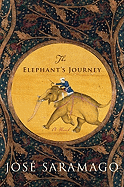
 A charming, heartfelt animal tale isn't what we expect from the late Nobel Prize winner José Saramago--least of all one in which the pachyderm unleashes genuine emotion in everyone who crosses its path.
A charming, heartfelt animal tale isn't what we expect from the late Nobel Prize winner José Saramago--least of all one in which the pachyderm unleashes genuine emotion in everyone who crosses its path.
His grim, unrelenting Blindness may be most readers' idea of the definitive Saramago, but don't underestimate his lighter works, his mystical, humane The Cave and farcical The Double. His newest novel, The Elephant's Journey, is squarely in the second group. Based on a true event in 1551--the wedding gift of an elephant sent by Dom João the Third, King of Portugal, to the Archduke Maximilian of Austria, and chronicling the elephant's journey across Spain to Vienna--the tale unfolds like a medieval tapestry, told with delightful irony and whimsical good humor. The elephant is a total charmer, as is the host of colorful characters who fall under his spell, but the chronicler's tone of voice is Saramago's supreme achievement, a comical banquet of ironic understatements, convoluted thinking and universal platitudes.
True, there are still Saramago's trademark eccentricities that make his novels troublesome-going for some: paragraphs that go on for pages, no quotation marks, dialogue separated only by commas, and this time he even declines to capitalize names. The extra attention this demands only slows the reader down and immerses one deeper in the Portuguese world of 1551, when many people had no idea what an elephant even looked like.
Solomon is not an African elephant with big ears, he's a somewhat smaller Asian elephant with freckles and hair. He weighs four tons. He's mistaken by terrified villagers for God, and tricked into kneeling before the basilica by the priest. A passionate battle with Austrian soldiers nearly erupts over who exactly will be delivering the elephant to the Archduke. The porters are reduced to tears saying goodbye to him. Solomon touches everyone who crosses his path--the archduchess, the commanding officer--and these heartfelt moments in this ironic epic tale add an element of beguiling sincerity. The love between Solomon and Subhro, the mahout who tends and rides the elephant, is particularly poignant, which heightens the drama of the novel's final third section as Solomon follows in the footsteps of Hannibal, trekking through snowstorms in the Alps.
With set-piece after set-piece brought to life with economy and wit, this picaresque collection of Solomon's adventures has an earthy dignity (his defecations are titanic) and builds cumulatively to the climactic rescue of a child that's oddly unsentimental and strangely moving. --Nick DiMartino
Shelf Talker: A charming tale from José Saramago, immersing the reader in an elephant's journey from Spain to Vienna in 1551.

